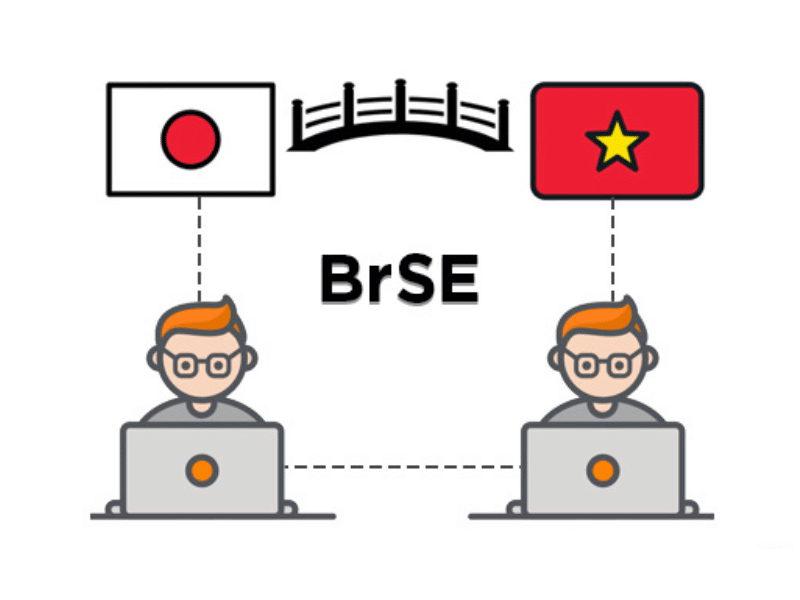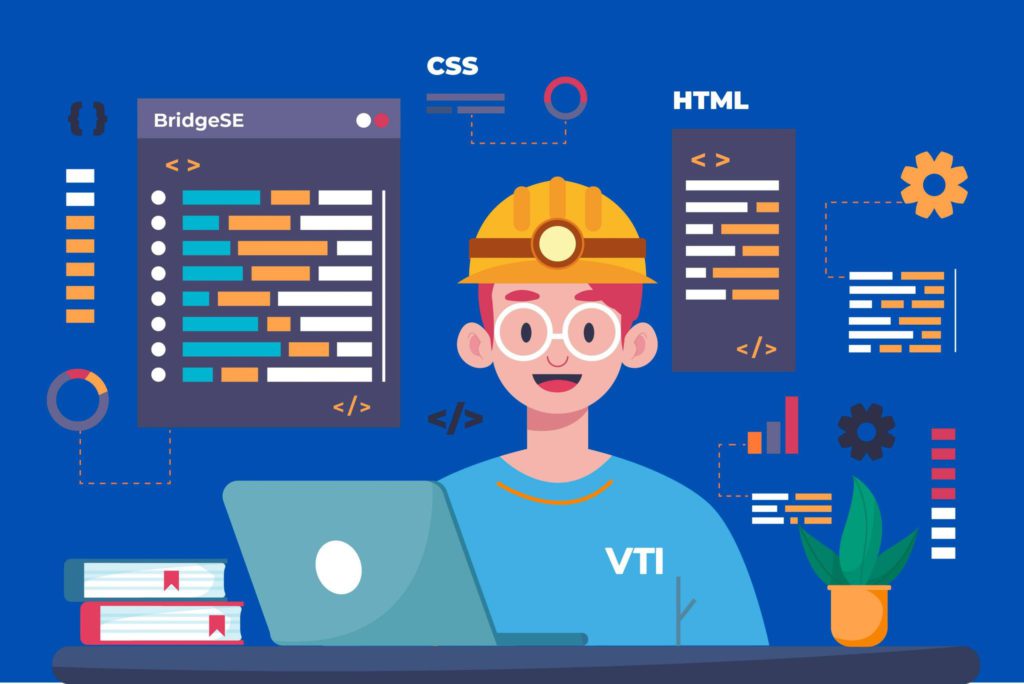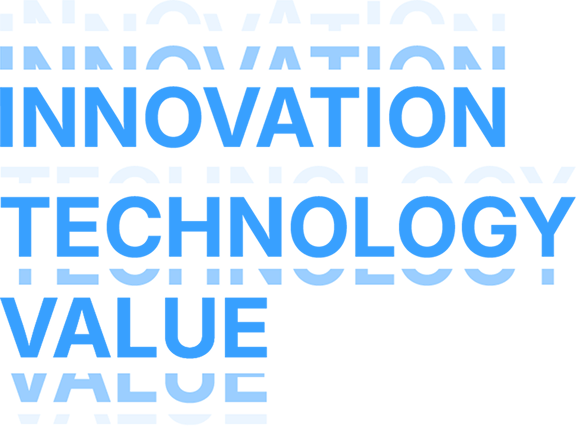Offshore development services, which have lower labor costs than domestic ones, are attracting the attention of many companies because they contribute to significant cost reduction. Bridge system engineer is one of the elements that make offshore development go smoothly when many obstacles arise.
1. What is a Bridge System Engineer (BrSE)?

Bridge System Engineer (abbreviation of BrSE) refers to a person who acts as a bridge between the customer side and the offshore development side to ensure that the project progresses smoothly. The role of BrSE is widely popular in outsourcing companies working with clients from Japan. Nevertheless, this position is also present in companies catering to clients from other countries, albeit not as extensively.
2. The Importance of Bridge System Engineers in Offshore Development Projects
In some respects, it is no exaggeration to say that the role of a Bridge System Engineer is a distinctive feature primarily observed in IT companies, especially within the offshore development industry. One of the key reasons why BrSEs are crucial for offshore development projects is their ability to prevent two common failures in such projects.Firstly, they assist in overcoming the language barrier that arises in offshore development projects. Collaborating with talent residing in different countries, a characteristic of offshore development, implies dealing with different languages. During an outsourcing project, having 1 to 2 BrSEs along with developers proficient in the client’s language (such as Japanese, English, Korean, etc.) can help companies effectively convey their requirements and needs to the development team. Overall, the client only needs to consult with around 3 to 4 individuals, including BrSEs and Project Managers. This streamlines the process of gathering all information in one place and makes it easier to manage.Secondly, they facilitate the smooth progress of the high-level phases of a project. This involves analyzing the client’s usage and requirements and proposing solutions that address their challenges. BrSEs with a strong understanding of IT (sometimes acting as an alternative to Project Managers) are capable of analyzing the client’s existing software systems and challenges, conducting small-scale tests, and taking on various roles.In this way, serving as a bridge of cooperation between both sides, BrSEs prove to be invaluable individuals.
3. The Roles of Bridge System Engineer
3.1. Language and Technology
Bridge System Engineers are more than just translators; they’re individuals who are not only proficient in Japanese or any language but also possess a strong foundation in IT knowledge. This is crucial because BrSEs are responsible for elucidating client requirements to developers, articulating developers’ perspectives and project progress to clients, and navigating solutions in cases of discord, all while ensuring that progress remains unaffected. The key requirement for a Bridge System Engineer is to thoroughly grasp what deliverables the client desires or how to address the client’s challenges, and then convey this in a manner that developers can comprehend in terms of software development. Hence, IT knowledge is indispensable.In reality, the majority of those who transition into the role of a Bridge System Engineer have previously accumulated at least 1 to 2 years of experience as developers. They subsequently shift focus towards honing their foreign language and project management skills, emphasizing this aspect before making the career transition.
3.2. Flexible Roles at Different Stages of the Project
It’s not surprising that a bridge system engineer takes on different roles in various stages of a project. For example, in the early stages of a project, they undertake activities similar to those of a Business Analyst, such as analyzing customer needs and specifications and then proposing solutions. During the implementation phase, they might take on the role of a Project Manager, overseeing the progress of the project, acting as a linguistic intermediary, and even testing the software like a Tester. It’s a multifaceted role that involves a range of responsibilities.
4. Bridge System Engineer Responsibility and Annual Salary
4.1. Bridge System Engineer Responsibilities
The Bridge System Engineer, who is responsible for the role of a bridge between both sides to ensure that offshore development progresses smoothly, is responsible for the following tasks.Daily work:
- Process customer communications, emails, etc.
- Create a daily plan
- Supervise and report on project progress
- Create reports for the week, month, quarter, etc.
Work by project:
- Analyze customer requirements/specifications and propose methods
- Create offshore design documents
- Explain development and design details to the development team
- Test the finished product
- Offshore development progress/quality report to customers
- Support both sides meeting settings etc.
4.2. Bridge System Engineer Annual Salary
The annual salary of a BrSE can vary depending on factors such as experience and skills, and it also varies by region. For example, in Japan, the annual salary for a BrSE typically ranges from 4.5 million yen to 8.5 million yen (Around 30,000 to 57,000 USD). On the other hand, when leveraging offshore services in a place like Vietnam, it’s possible to pay experienced professionals half of that annual salary.
5. What Problems Do Bridge System Engineers Have When Working and Solutions?
5.1. Language Barrier
The role of BrSEs is predominantly found in companies that work with Japanese clients, therefore, they must be fluent in that language. For example, the Japanese language has its ambiguity, so even if people who don’t speak Japanese understand these things, they may not be able to put into words what they want to say. BrSE requires the skills to have natural conversations like a Japanese person. Because customers are not always in a good mood during a project. In order to respond flexibly to angry customers, it is essential to have the skill to speak Japanese like a Japanese person.
5.2. Distance Barrier
Utilizing offshore development overseas creates a barrier of distance. Communication tools primarily consist of emails and platforms like Zoom, Skype, etc. which differ from face-to-face discussions. BrSEs are more likely to experience obstacles and probable failures if they lack the ability to clarify text.
5.3. Time Difference
When implementing offshore development abroad, you’ll inevitably face some impact from time zone differences. A 2-hour time gap between Japan and Vietnam might not have much of an effect, but in the case of Vietnam and the United States, it can be quite significant. Therefore, BrSEs should carefully consider when to schedule meetings and other activities.
5.4. Different Cultures
Different cultures have different common sense and knowledge, which makes it easy to misunderstand. If the BrSE does not have a good understanding of the cultures of both countries, the project will not be successful.
5.5. Requirements/Specifications are Unclear
Clients are often confused by the specifications offered since they are unfamiliar with IT technology. Furthermore, if you question the customer again, you may get an ambiguous response. In such instances, an expert BrSE may discern what is critical among the specìications, allowing them to comprehend the development strategy.
6. Skills Required for Bridge System Engineer
To become a bridge system engineer, you must have various skills. Among them, the following skills are very important.
6.1. Foreign Language/Communication Skills
As mentioned above, a BrSE needs not only proficiency in foreign languages but also an understanding of Japanese culture to ensure that information is conveyed accurately and clearly to both clients and project team members, facilitating smooth progress in the work. Additionally, the effective communication skills of the BrSE are immensely valuable in resolving conflicts within the project.
6.2. Technical Competency
BrSEs need to acquire knowledge to the extent that they can pass the Basic Information Technology Examination (FE) or IT Passport Examination, which requires basic information technology knowledge and understanding (to the extent that they can understand development projects and explain them in Japanese). It is also important to have a basic working knowledge of scripting, HTML/CSS/JS, Git workflow, and basic UI design (wireframing), and to be proficient in at least one programming language.
6.3. Management Skills
A BrSE needs to have a comprehensive understanding of the software development cycle and project management methodologies. They are required not only to acquire certifications like Professional Scrum Master Level I or Agile Certified Practitioner (PMI-ACP), but also to possess learning skills, sensitivity, and practicality.
Conclusion
It can be seen that the requirements from a BrSE are quite high with many important skills. However, being a BrSE means that you have the opportunity to work in an international environment, learn many new skills, and develop a career in the field of technology. At the same time, BrSE also has the chance to interact with many international customers and partners, creating good relationships and expanding its business network.With abundant human resources and years of experience working with partners from Vietnam, Japan, Korea, and Singapore, VTI’s engineers have developed excellent responsiveness. Our line managers can communicate in English, Japanese, Korean, and Chinese, depending on the market they are in charge of. In particular, the majority of employees working at our offices in Japan, Korea, or Singapore are bridge systems engineers who are fluent in these languages so we can quickly work on-site at our customers’ headquarters, helping to reduce offshore development time. In addition, we have a course to train BrSEs in IT technology, and we will do our best to ensure that BrSEs have high language and technical skills.
VTI – Innovation Technology Value
Hotline: (+84) 24 7306 9996
Email: [email protected]
Facebook: https://www.facebook.com/VTI.JSC/
LinkedIn: https://www.linkedin.com/company/vtijsc/
![[FREE EBOOK] Strategic Vietnam IT Outsourcing: Optimizing Cost and Workforce Efficiency](https://vti.com.vn/wp-content/uploads/2023/08/cover-mockup_ebook-it-outsourcing-20230331111004-ynxdn-1.png)





